Are you looking to take the plunge and go solar? While your initial system setup can seem painfully confusing at times, it’s definitely all worth it when it finally comes together and you can explore off-grid, making the most of your RVing freedom.
While solar power is free and environmentally friendly, your setup can still be pretty pricey. All the more reason to make sure that you have the very best solar charge controller for RV installed to protect your expensive deep-cycle batteries from overcharging.
Here’s all you need to know about RV solar charge controllers and how to find the best one for your solar setup with our buyer’s guide and reviews.
Table of Contents
- 1 What is a Solar Charge Controller?
- 2 Best Solar Charge Controller for RV
- 2.1 Victron Energy SmartSolar MPPT Solar Charge Controller (Bluetooth)
- 2.2 MidNite Solar CLASSIC 150 Charge Controller
- 2.3 Renogy Rover MPPT Solar Charge Controller
- 2.4 Renogy Wanderer PWM Negative Ground Charge Controller
- 2.5 EPEVER Solar Charge Controller
- 2.6 Renogy Voyager PWM Waterproof Solar Charge Controller
- 2.7 EPEVER MPPT Solar Charge Controller
- 2.8 RICH SOLAR MPPT Solar Charge Controller with LCD Display
- 2.9 WindyNation PWM Solar Panel Regulator Charge Controller
- 3 Compare the Best Solar Charge Controller
- 4 How We Picked. Buyer’s Guide to Buying the Best Solar Charge Controller
- 5 Types of Solar Charge Controller
- 6 Picking the Best Solar Charge Controller Video
- 7 FAQ: Best Solar Charge Controllers for RVs
- 8 Final Thoughts
What is a Solar Charge Controller?
A solar charge controller is an essential element in any solar setup. Your panels harvest the energy from the sun and your batteries conserve this energy so that it’s ready to use when you need it. In between the two, you need an RV solar charge controller.
When the sunlight hits your panels it isn’t always evenly distributed across the entire panel, with the same amount of energy going to each cell continuously. Your batteries, on the other hand, require a steady regular voltage to charge correctly.
In order to ensure that the sun’s energy does not damage your batteries, you need to install a power regulator. This is the job of your solar charge controller. It regulates the current flowing from your solar panels to ensure that your batteries have the steady level of current that they require to charge correctly, without any overcharging.
Best Solar Charge Controller for RV
Finding the best solar charge controller for your RV can take weeks of research. Get ahead with our RV solar charge controller reviews, narrow down your search to the very top models, and start saving energy sooner.
Victron Energy SmartSolar MPPT Solar Charge Controller (Bluetooth)
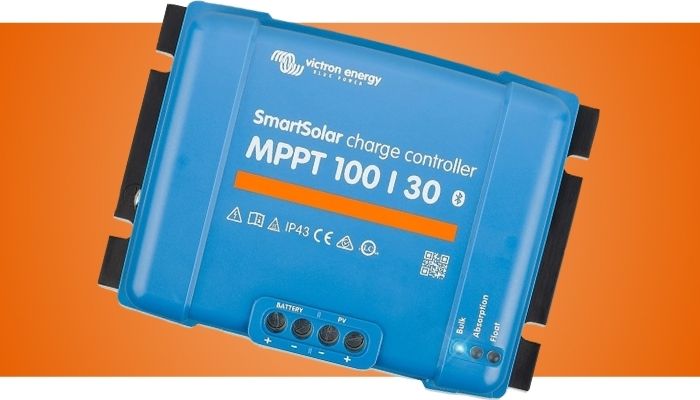
The SmartSolar MPPT 100V 30 Amp Solar Charge Controller by Victon Energy is an excellent choice for RV trailer solar panel setups. Suitable for 12V and 24V deep cycle batteries, you can use it with flooded acid, gel, AGM, or lithium batteries. It is also easy to customize the charge to suit your exact battery type via the eight pre-programmed algorithms that can be selected via the rotary switch.
With a nominal power of 440W at 12V, thanks to its innovative BlueStar algorithm, it always optimizes energy harvesting by locking to the optimum MPP to give you the very best charging levels, even when your panels are partially shaded. It is also capable of recharging severely depleted batteries, provided they are not damaged.
Highly efficient, this unit’s maximum efficiency exceeds 98%. However, as there is no cooling fan, if temperatures reach over 104 degrees F the full current output will drop, so you may want to add some external cooling mechanisms or install it in the coolest part of your trailer.
Thanks to its built-in Bluetooth connectivity, you can pair this RV solar controller with your smartphone to monitor, set up, update, and synchronize it via VictronConnect. This unit also features extensive safety protections including over-temperature, PV short circuit, PV reverse polarity, and PV reverse current protection, ensuring that your expensive deep-cycle batteries remain in prime condition.
Easy to use and set up, this Bluetooth-enabled RV solar controller is an excellent product at a reasonable price. Ideal for any RV solar setup.
MidNite Solar CLASSIC 150 Charge Controller
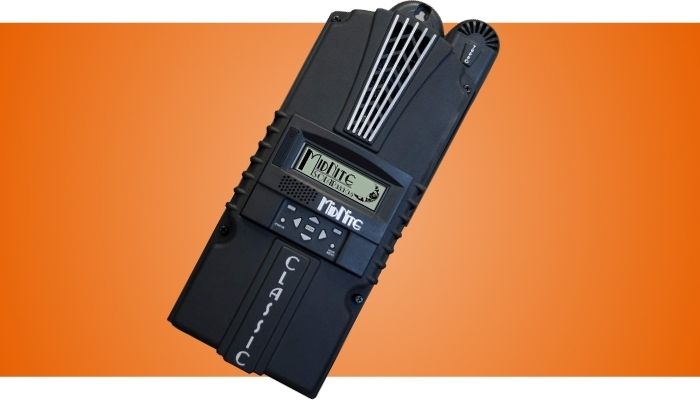
MidNite Solar’s most popular model, the Classic 150 Charge Controller is an outstanding but complex piece of kit. Compatible with 12V to 72V battery systems, it boasts solar, wind, and hydro MPPT modes making it a good choice if you are RVing full-time off-grid and looking to supplement your solar power with wind.
With an operating voltage of 150V and a maximum output current of 96 amps, it is more than sufficient for most RV solar setups. Made in the USA and listed by ETL for the US and Canada, this CE-certified listed charge controller also comes with free web monitoring, so you can see how it’s performing online. It also has a graphics panel and a touch button control pad.
Complete with all of the essential safety protections, including arc fault and ground fault protection, this high quality unit comes complete with a five year warranty. This can be extended for a further two years with a tune up and wearable parts replacement for an additional fee if you organize shipping your unit back six months prior to its warranty end date.
While this is widely considered as a very good charge controller for both solar and wind power for your RV, not only is it very expensive, it is also very complicated. If you do not have an in-depth understanding of electrics, then you will struggle with the user manual and even the device settings on the display.
Of course, you can learn as you go, however, if you are looking for a plug and play, easy to use RV solar charge controller, this one is not going to work for you.
Renogy Rover MPPT Solar Charge Controller
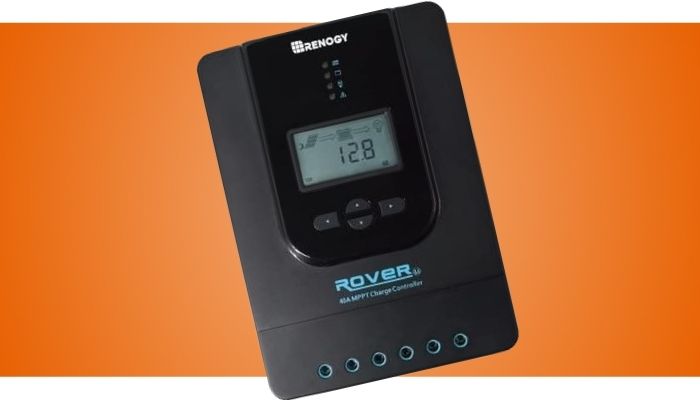
Recently redesigned, the Rover 40 Amp MPPT Solar Charge Controller by solar power specialists Renogy is a highly efficient, easy to use model complete with an LCD screen and error code detection for easy self diagnoses. Compatible with most deep cycle battery types, including flooded, sealed, gel, and lithium, it automatically detects your 12V or 24V system voltage.
Capable of charging over-discharged lithium-ion batteries, thanks to its innovative MPPT technology, this RV solar charge controller has a high tracking efficiency of up to 99% with a peak conversion of 98% for faster, more effective charging when you’re off-grid. It has a maximum solar input voltage of 100 VDC, plenty enough for your average RV solar setup.
With its four-stage charging system, bulk, boost, float, and equalization, it will keep your batteries topped up and in excellent condition. You can also program the charging parameters via the LCD screen. Purchase the additional BT-1 Bluetooth Module and you can pair this solar charge controller with your smartphone to monitor it via the Renogy DC Home smartphone app.
Its die-cast aluminum construction provides this controller with extra protection against wear and tear for a longer lifespan, as well as helping to dissipate heat build up. Numerous safety features are built-in, including overcharging, short circuit, reverse, overload, and over-discharging protection, to ensure that your batteries and controller last for as long as possible.
Relatively easy to use and install, just be aware that this unit is a little bulky and requires a six-inch clearance above and below. So double-check that its dimensions are compatible with the location in which you are planning on installing it in your trailer. All in all, a good budget MPPT solar charge controller model.
Renogy Wanderer PWM Negative Ground Charge Controller
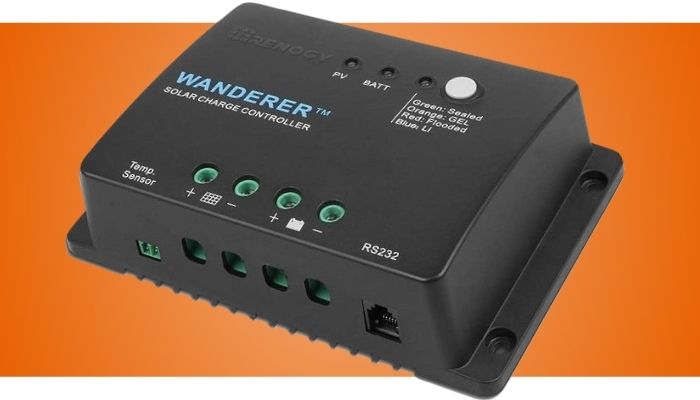
If you’re in the market for a PWM RV solar charge controller, make sure you check out the Renogy Wanderer. This updated version makes it easier to install and use.
Specifically optimized for a 12V system, the LED indicators and battery button allow you to select your battery type from flooded, gel, sealed, or lithium. The colors and light duration change with your battery type and charge status.
With a maximum PV input power of 400W and 25VDC maximum voltage input, this little unit will work with most RV solar systems. It has an optional temperature sensor port and like the previous unit, you can also purchase the BT-1 Bluetooth module in order to be able to monitor and control this model via your smartphone.
Thanks to its numerous safety protections, including intelligent protection against reverse polarity, short-circuit, reverse charging, and overcharging, plus temperature compensation, this little unit is a popular option for low power setups.
As this model is a PWM controller, while you won’t get the same high efficiency from this unit as with an MPPT model, it still makes a good budget choice and is also easy to use thanks to its simple user interface with multiple LED indicators.
EPEVER Solar Charge Controller
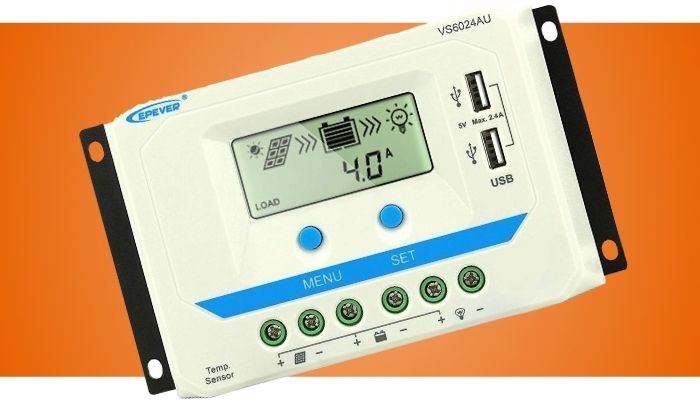
If you are setting up a solar system on a budget and need an easy to install solar charge controller, this version by Epever could be a good fit for your needs. It is compatible with budget-friendly flooded and sealed acid batteries, as well as gel ones with its three-stage intelligent PWM charging program.
This 60 amp RV solar charge controller automatically detects your system’s 12V or 24 V DC and has a maximum input power of 720W at 12V. With its clear display, you can easily check on your charging progress. This unit also has two USB ports with a maximum 5V 2.4 amp output to charge up your small electronic devices.
Thanks to its heat sink design, this controller achieves good heat dissipation levels. It also has a battery temperature compensation function and extensive electronic protection. The terminals are UL and VDE certified for greater reliability, while the three load working modes, manual, dusk to dawn, and time control allow you to set up this unit to suit your needs.
While this is not an expensive model, for a PWM version, its price is a little high. Also, the screw heads could be better quality. However, given its ease of use, especially for solar power newbies, it could be just what you need to get your first few solar panels charging your battery while you save up for a more extensive setup.
Renogy Voyager PWM Waterproof Solar Charge Controller
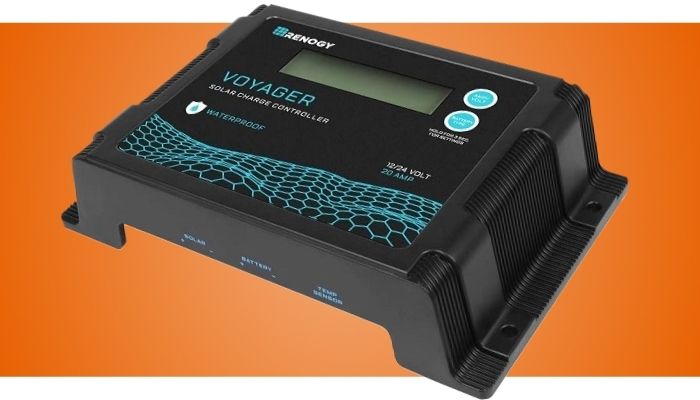
The new and improved Renogy Voyager PWM Waterproof Solar Charger is a highly reliable choice for using with your RV on trips off-grid, as well as a power maintainer during storage periods.
Thanks to its watertight design, you won’t have to worry about any unexpected downpours, while the bright blue backlit display makes it easy to read system information and error codes.
This smart four-stage PWM 20A charge controller is suitable for sealed, flooded, gel, and lithium batteries. It automatically recognizes 12V and 24V setups and you can alter the settings via the double key operation buttons. It has a maximum PV input voltage of 55VDC and a maximum PV power rated at 260W on 12V ideal for campers or small trailers.
Installation is easy thanks to the pre-drilled holes and the unit features multiple battery, controller and solar panel in-built protections, such as reverse polarity, to ensure excellent reliability and a long lifespan of all components.
While you may prefer an MPPT controller with a higher capacity for large solar set ups, as a storage maintainer or for small solar systems, this waterproof controller makes a handy choice that is highly versatile, good value for money, and nice and easy to use.
EPEVER MPPT Solar Charge Controller

The 60A 150V MPPT Solar Charger Controller by Epever has been designed to realize diversified work loads and can support up to eight panels charging in parallel, ideal if you have a regularly expanding solar system. Thanks to its ultra-fast tracking speed and MPPT technology, it has a very high tracing efficiency of 99.5%, to deliver your batteries a maximum of power.
It supports four charging options for gel, sealed, flooded, and user programmed. If you wish to use it to charge your lithium batteries, you can select the user profile and set it up to match your battery manufacturer’s recommendations for lithium batteries. The clear digital display gives you a clear reading of real-time energy recording and the adaptive three-stage charging mode.
CE certified, this RV solar charge controller also benefits from multiple safety protections, including overcharging, over-discharging, and reverse polarity for a long product lifespan and greater reliability. There is also a battery temperature compensation function, plus a statistical function, to ensure that you get the very best results and can monitor your system in detail.
Thanks to its clear display, advanced technology, and ease of use, this MPPT solar charge controller is a popular choice for RVers looking to expand their solar setup. Given its performance, it’s a good value for money product with high efficiency levels for rapid solar charging.
RICH SOLAR MPPT Solar Charge Controller with LCD Display
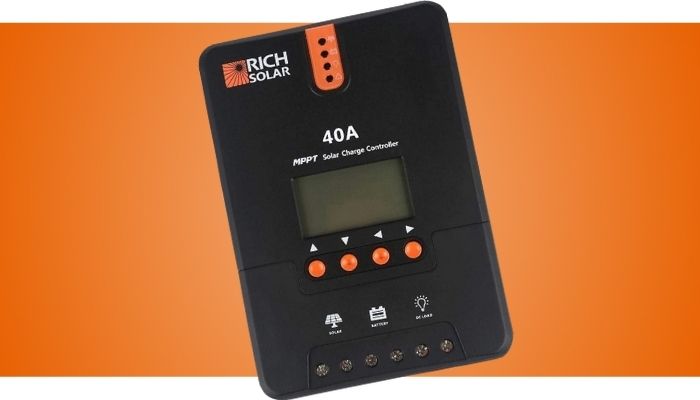
The 40A MPPT Solar Charge Controller by Rich Solar is a budget-priced model with a lot in common with the Renogy Rover. In fact, this unit even has the same RS232 port and is advertised as being compatible with the Rengy BT-1 Bluetooth module, allowing you to control it remotely via your smartphone.
Compatible with sealed, flooded, gel, and lithium batteries, this RV solar charge controller also has diverse load control and is capable of charging over-discharged lithium deep cycle batteries. Easy to use thanks to its large LCD screen with programmable parameters and error codes, numerous LED indicators alert you to various charging stages and system readings.
This unit has a high tracking efficiency of up to 99%, ensuring you get your house batteries charged up rapidly. Its die-cast aluminum design helps to dissipate heat, while the numerous built-in safety protections ensure your unit functions correctly and protect your entire system.
On the downside, unfortunately, this unit has very poorly translated instructions which can be misleading if you don’t have much experience with solar power systems. However, given its strong similarities with the Renogy model at a cheaper price, it makes a good value for money buy.
WindyNation PWM Solar Panel Regulator Charge Controller
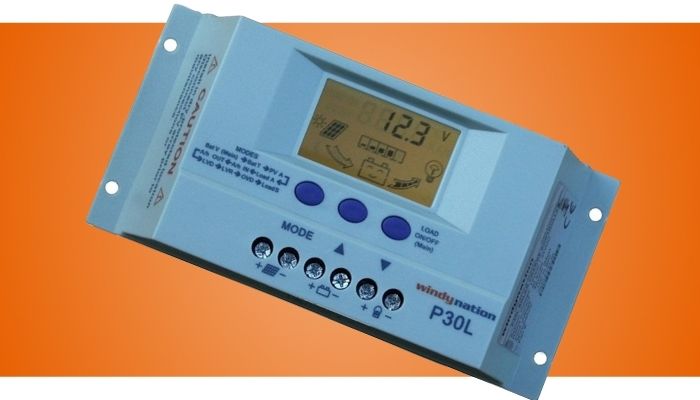
If you are looking for a premium, user-friendly PWM solar panel charge controller, this model by WindyNation makes an excellent choice for your RV thanks to its digital LCD and easy configuration.
While this is not a typical three-stage charge controller, it can be used to set the load cutoff level to suit your specific battery type to prevent damage. However, if you are after a “set it and forget it” model, you would be better off with one of our four-stage controller recommendations.
This unit has plenty of built-in electronic protections, including overload, reverse polarity, and short circuit, while it’s easy to set up for your specific battery type including AGM, gel, and lead acid. A battery temperature sensor is included and you can quickly and easily adjust system settings with the mode buttons.
The LCD provides a wealth of system information so you can see exactly what amperage, voltage, and load you are receiving from your panels. Connect up to 400W of solar panels, this 30 amp controller has a well written instruction manual which certainly helps compared to many others when you’re just starting out with off grid solar power.
While there are other better all-round models on the market, for its ease of use and excellent display, this 30A PWM solar panel regulator charge makes a great choice for anyone getting their first solar system set up and looking for a budget priced PWM model that is clear and easy to understand.
Compare the Best Solar Charge Controller
| Image | Title | Price | Rating | Buy |
|---|---|---|---|---|
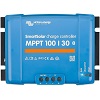 |
Victron Energy SmartSolar MPPT |
$$$$
|
Buy on Amazon | |
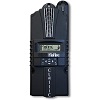 |
MidNite Solar CLASSIC |
$$$$$
|
Buy on Amazon | |
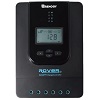 |
Renogy Rover MPPT |
$$$
|
Buy on Amazon | |
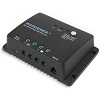 |
Renogy Wanderer PWM |
$
|
Buy on Amazon | |
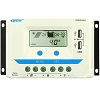 |
EPEVER Solar Charge Controller |
$$
|
Buy on Amazon | |
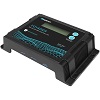 |
Renogy Voyager PWM |
$
|
Buy on Amazon | |
 |
EPEVER MPPT Charge Controller |
$$$$
|
Buy on Amazon | |
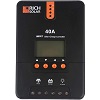 |
RICH SOLAR MPPT |
$$$
|
Buy on Amazon | |
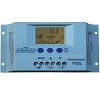 |
WindyNation PWM |
$
|
Buy on Amazon |
How We Picked. Buyer’s Guide to Buying the Best Solar Charge Controller
With so many solar charge controllers to choose from, you may feel overwhelmed by the sheer number of products.
To make sure that you choose the best solar controller for your needs and anticipated future requirements, take a quick read through our buying guide. We’ve highlighted the main features that you’ll need to consider before picking out a specific model.
Price
As your solar charge controller is essential to your solar set up, protecting your expensive batteries from damage, as well as deterioration, you shouldn’t be tempted to scrimp too much in the price. While you can pick up cheap versions, you should really focus upon purchasing a quality unit from a reputable brand.
Obviously, the type of solar charge controller and its number of amps also dictate how expensive a unit is. PWM units are a lot cheaper than MPPT models (see below for an in-depth explanation). Similarly, a 10amp unit is going to cost much less than a 50amp one.
First of all, decide on your requirements, both immediate and in the near future if you are planning on adding to your current setup. You can pick up a good PWM RV solar charge controller from as little as $50 if you have low energy requirements. Otherwise, you’re looking at around $100-$200.
A good MPPT RV solar charger will come in at around $250-$500, or more if you are looking for something special with extra features and a very high power rating. At the lower end of these price ranges, you can get great models that work just as well as higher priced ones, albeit with fewer features. So, work out exactly what you need then set your budget according to your power requirements and any extra features that you’d prefer to have.
Amp Rating
Your RV solar charger controller will have an amp rating. This is essentially how much power your unit can handle. In order to work out your needs, add together all of the amps from each of your solar panels wired in parallel. If necessary allow for any upcoming future additions.
Once you have your total solar panel current in amps, you’ll need to add on another 20% to this figure. A higher capacity controller will be able to handle the load more easily while staying cooler and lasting longer, so don’t be tempted to spend less on a model that is only just about powerful enough.
Spend a bit more and get a more powerful unit that will adequately cover your needs and some more.
LOAD or LVD output
RV solar charge controllers with a Load or LVD output allow you to charge up small items directly from your controller. These items normally run off your 12VDC supply bypassing your inverter and only require a very low amount of power.
A cable runs directly from your controller to your RV fuse box where it will power these small electronics, cutting off the supply should your battery power drop down below a certain voltage.
Display Screen
Display screens can be really useful to let you know exactly how your system is working and how much power you have available, plus any error codes.
You can also see what stage of charging your batteries are at, as well as getting a better idea of how much power your panels are providing you within real-time figures. This can also help you to make any necessary adjustments or additions to enhance your RV solar setup.
Bluetooth Module
Monitoring your RV solar power system is even easier via Bluetooth with your smartphone. This can be an excellent way to keep an eye on how much power your system is generating, as well as how to make any improvements.
With all of the details on your smartphone, you can easily work out if you are meeting your solar energy targets and come up with minimum and maximum figures to take the guesswork out of planning your next trip off grid.
Keep Temperature & Cooling in Mind
Most batteries need different charging parameters at different temperatures. Your RV solar charge controller will have a built-in or remote temperature sensor to make sure that your batteries are being charged according to the conditions they’re in.
If your charge controller is located some distance from your batteries at a significantly different temperature, you may need to opt for a remote temperature sensor to ensure that your controller has an accurate temperature reading.
To ensure that your RV solar charge controller doesn’t overheat, make sure that you install it with enough space for adequate ventilation and that it has a sufficient power rating to ensure it’s not overworked.
Safety Features
As with any electrical device, safety is paramount. Not only do you want to ensure that your expensive deep cycle batteries remain in good working order, plus your solar panels, electrical faults can lead to overheating that could cause a fire in your RV. Here are some of the most essential safety features that all solar charge controllers should have:
- Reverse polarity protection.
- Overcharging protection.
- Short-circuit protection.
- Overload protection.
- Arc fault protection.
Supported Battery Technology
Make sure that your RV solar charge controller is compatible with your battery type. Most units will list the types of batteries that they have an automatic charging profile for.
You may also prefer to look out for models that have a user defined setting, so that you can set up your RV solar charge controller to charge up your battery exactly as recommended by your particular battery manufacturer.
While most controllers will list standard flooded, sealed, and gel batteries, not all units are currently compatible with lithium batteries, so do double-check carefully before ordering if you own or are considering upgrading to lithium RV house batteries.
Types of Solar Charge Controller
Perhaps the most important decision you’ll need to make before deciding on a specific model of RV solar charger is what type of controller you’re going to go for.
To make sure that you choose the appropriate type for your RV solar setup, let’s take a detailed look at the two types and their main differences.
PWM Solar Charge Controller
PWM stands for Pulse Width Modulation. PWM solar charge controllers draw the charge out of your solar panels at a rate just above the battery voltage.
Basically, a PWM controller will switch on for bulk charging your battery, then move to a pulsing on and off mode to hold it at the absorption voltage. Once your battery is at the flat stage, it switches off, then pulses back on and off to hold it at the float voltage.
MPPT Solar Charge Controller
MPPT stands for Maximum Power Point Tracking. MPPT charge controllers are more advanced and therefore more expensive. They drop down the voltage to meet your battery’s recharge requirements, while simultaneously increasing the current by the same ratio that the voltage is dropped.
An MPPT controller returns higher yields at higher panel voltages, harvesting more energy than a PWM model. MPPT solar charge controllers can be up to 99% efficient, increasing the performance of your solar panels by over 20% compared to PWM controllers.
On the whole, MPPT solar charge controllers are generally favored by RVers. However, they do cost quite a lot more, although you can harvest more power from fewer panels than with a PWM. Here’s how to choose if you’re still undecided.
In short, choose a PWM solar charge controller if you need a low cost option and:
- You are only trickle charging.
- You have a very small system.
- You have a maximum voltage of 18V for one 12V battery.
Or an MPPT solar charge controller if:
- You have a large RV solar system.
- If your solar panel voltage is significantly higher than your battery voltage.
- You spend a lot of time off grid and rely on solar power for all of your appliances.
Picking the Best Solar Charge Controller Video
FAQ: Best Solar Charge Controllers for RVs
As you embark on your journey towards harnessing the power of solar energy for your RV, it’s natural to have questions about solar charge controllers. These crucial devices play a vital role in optimizing your RV’s solar power system, ensuring efficient charging, and safeguarding your batteries from potential damage. To provide you with clarity and guidance, we’ve compiled a list of frequently asked questions (FAQ) about the best solar charge controllers for RVs. Whether you’re new to solar technology or seeking specific information, this FAQ section aims to address common queries and empower you to make informed decisions. From understanding different types of charge controllers to selecting the right size and exploring additional features, we’ve got you covered. So, let’s dive into the world of solar charge controllers and unlock the potential of clean, renewable energy for your RV adventures.
What is a solar charge controller, and why do I need one for my RV?
A solar charge controller is a device that regulates the flow of electricity from your solar panels to your RV’s batteries. It prevents overcharging, ensures optimal charging efficiency, and protects your batteries from damage. A charge controller is essential to maximize the performance and lifespan of your RV’s solar power system.
What are the different types of solar charge controllers available for RVs?
There are primarily three types of solar charge controllers: PWM (Pulse Width Modulation), MPPT (Maximum Power Point Tracking), and basic on/off controllers. PWM controllers are cost-effective and suitable for smaller RV setups. MPPT controllers are more efficient, especially in low-light conditions, and can handle higher voltage systems. Basic on/off controllers are the simplest type but lack advanced features.
How do I determine the right size of a solar charge controller for my RV?
To determine the appropriate size of a solar charge controller, you need to consider the total wattage of your solar panels. Ideally, the controller’s current rating should be equal to or greater than the total current output of your solar panels. It’s recommended to choose a charge controller with a slightly higher current rating to accommodate potential expansion of your solar system.
Can I use any charge controller for my RV’s battery type?
While some charge controllers are compatible with all battery types (lead-acid, gel, AGM), others may be specifically designed for a particular battery chemistry. It’s crucial to check the specifications and ensure that the charge controller you choose is suitable for your RV’s battery type. Using an incompatible controller may lead to improper charging or damage to your batteries.
How important is the display and user interface of a solar charge controller?
The display and user interface of a solar charge controller play a vital role in monitoring and managing your RV’s solar system. A clear and intuitive display allows you to track battery voltage, charging current, solar panel performance, and other essential information. User-friendly interfaces make it easier to configure settings and make adjustments for optimal charging performance.
Are there any additional features I should look for in a solar charge controller for my RV?
While the core functionality of a charge controller is to regulate charging, some models offer additional features that can enhance your RV’s solar setup. These may include built-in USB ports for charging small devices, temperature compensation to adjust charging voltage based on temperature, battery equalization functions, remote monitoring capabilities, and advanced protection features like overcharge, short-circuit, and reverse polarity protection.
Can I install a solar charge controller myself, or do I need professional help?
Installing a solar charge controller in your RV can generally be done as a DIY project. However, it’s important to follow the manufacturer’s instructions and ensure proper wiring connections. If you’re not familiar with electrical systems or if the installation is part of a larger solar setup, it’s advisable to seek professional assistance to ensure a safe and efficient installation.
What is the warranty period for solar charge controllers, and do I need one?
The warranty period for solar charge controllers can vary among manufacturers but typically ranges from 1 to 5 years. Having a warranty is recommended as it provides protection against any manufacturing defects or malfunctions. Be sure to check the warranty terms and conditions, including any specific requirements for warranty claims and customer support.
Can I use multiple solar charge controllers in my RV’s solar system?
Yes, it is possible to use multiple charge controllers in an RV’s solar system, especially when you have multiple solar panels or battery banks. This setup allows for better control and management of the charging process. However, it’s crucial to ensure proper coordination and synchronization between the controllers to prevent any conflicts or issues.
How much does a solar charge controller for an RV cost?
The cost of a solar charge controller for an RV varies depending on factors such as its type, brand, capacity, and additional features. Generally, PWM charge controllers are more affordable, ranging from $30 to $150, while MPPT charge controllers tend to be pricier, typically ranging from $100 to $500. Investing in a quality charge controller that suits your specific needs is a wise choice for long-term solar system performance.
Remember, it’s important to research and compare different models to find the best solar charge controller for your RV, considering your power requirements, battery type, and budget.
Final Thoughts
With so many options to consider, it’s hardly surprising that some RVers take several months planning before finally going solar. If you want to experience real freedom exploring far and wide in your RV, you’ll need to get your solar system up and running.
Looking for some helpful advice? If you’re still stuck deciding and you are looking for a great Bluetooth-enabled model, you can’t go wrong with the SmartSolar MPPT by Victron Energy. Even when your panels are partially shaded, this technologically advanced solar charge controller ensures you get the very best charging levels. Easy to use with a great nominal power of 440W at 12V, this unit is one of the most popular models around.
On a budget but still need an MPPT solar charge controller? Take another look at the Rover by Renogy. This 40 amp controller is highly efficient and very simple to understand thanks to its clear LCD screen complete with LEDs and error code detection for easy self diagnoses.
Are you looking for a small PWM solar charge controller to keep your RV charged up while it’s not in use? The Renogy Voyager Waterproof Solar Charge controller is a great model that will enable you to keep your vent fan and other essentials running plus your battery topped up ready while your RV is off the road.